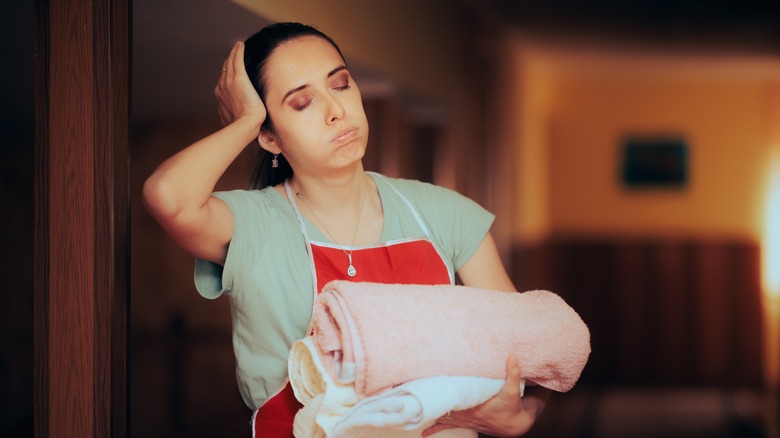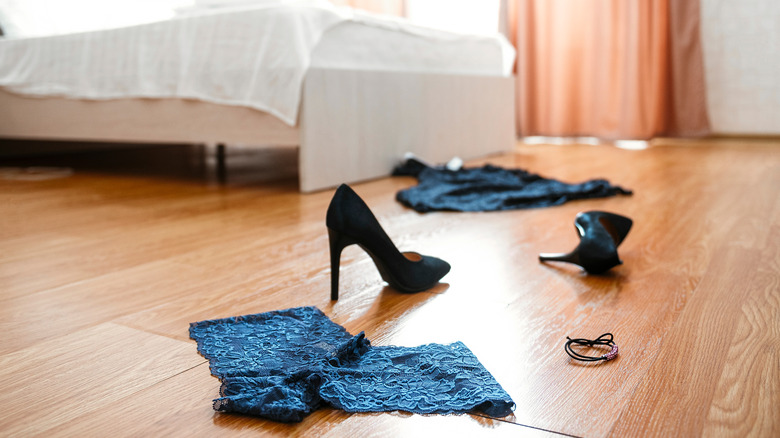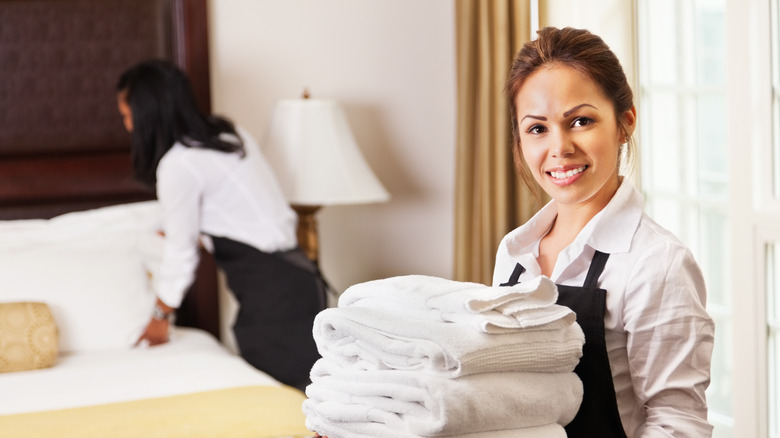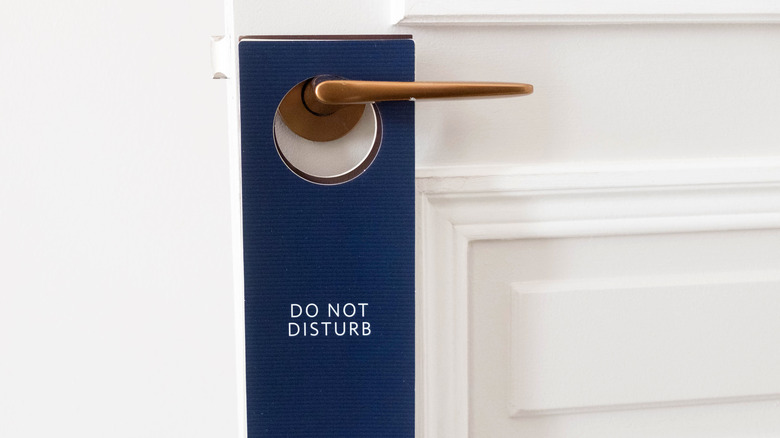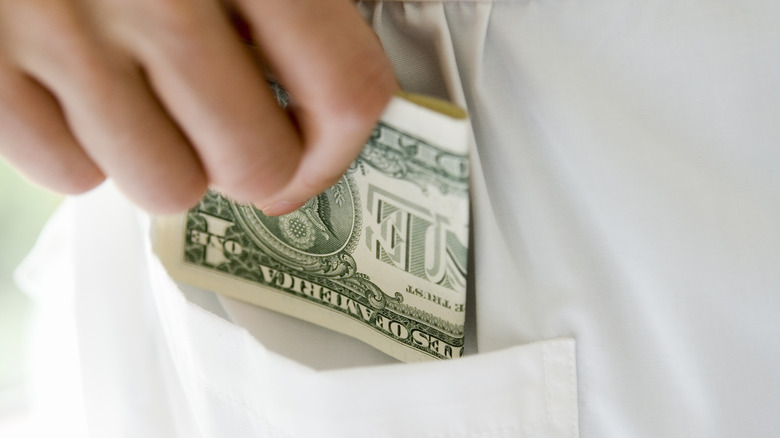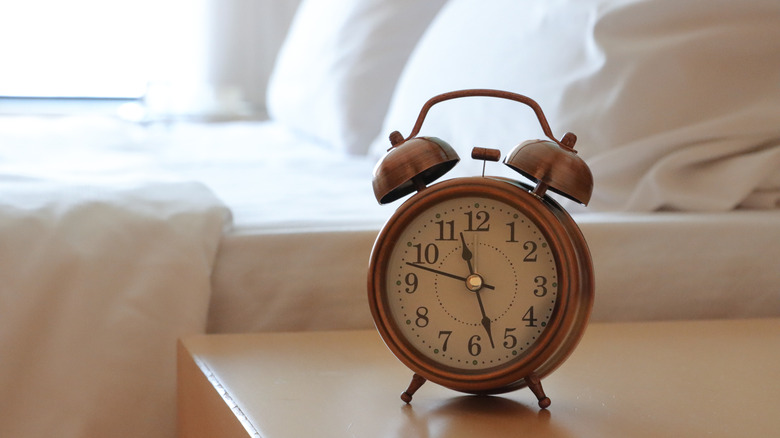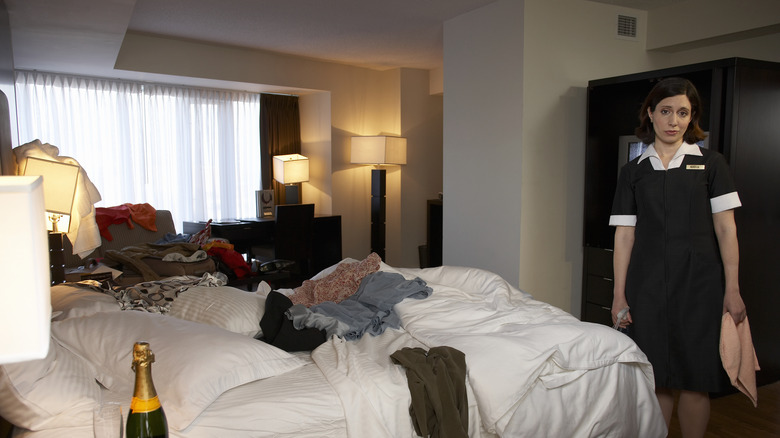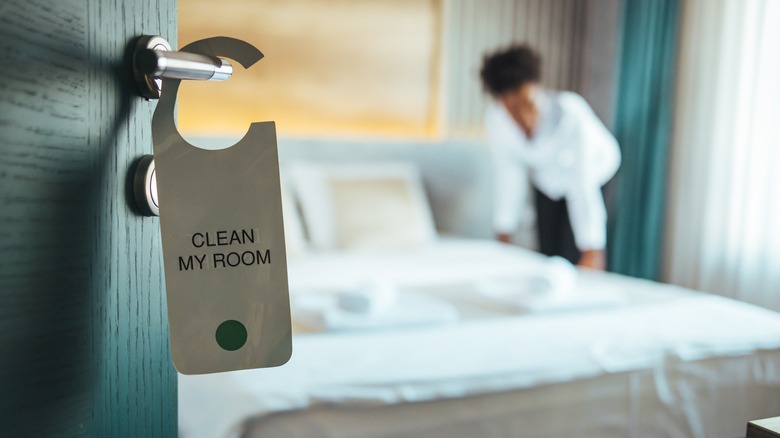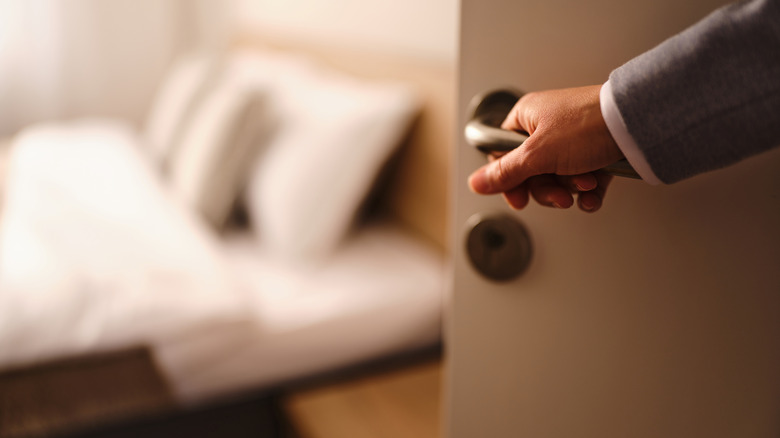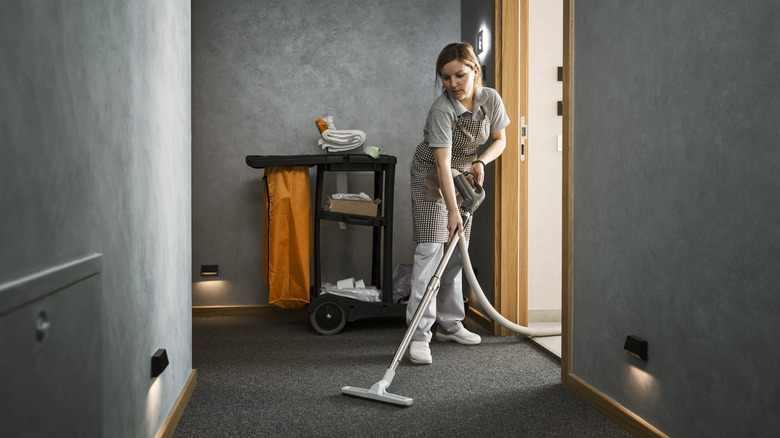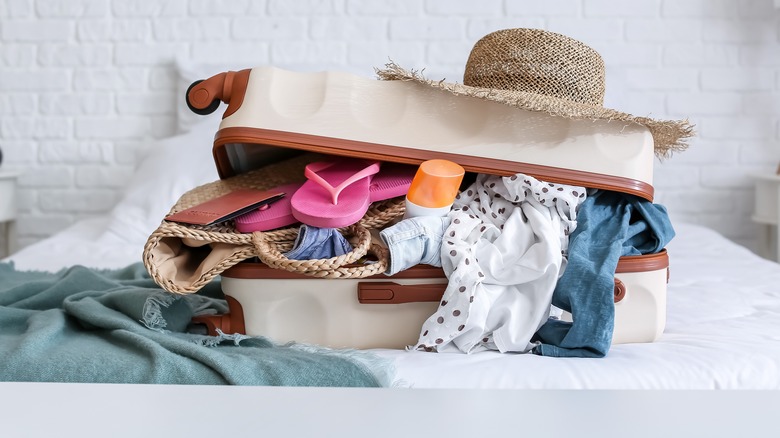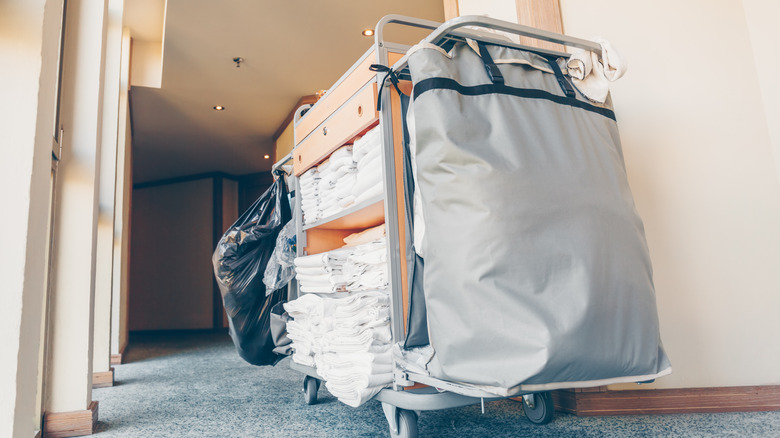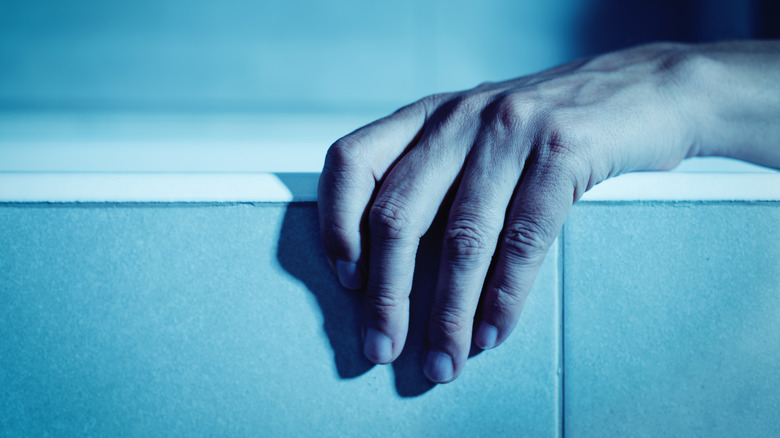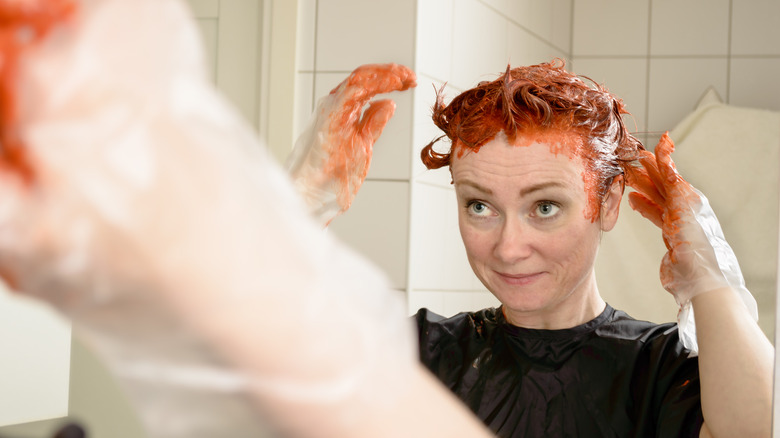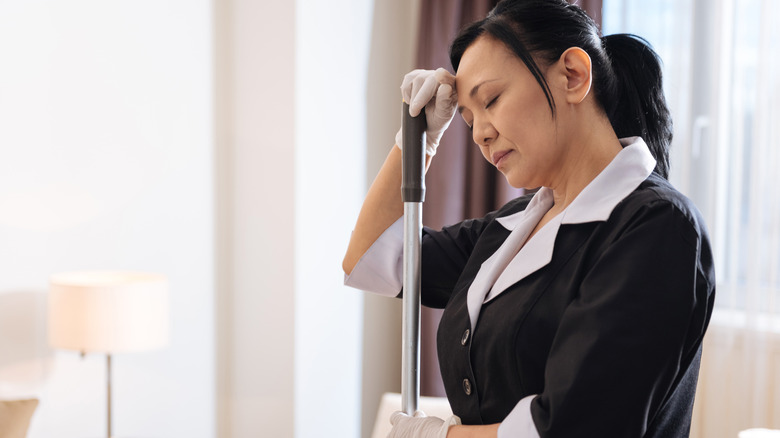Things Hotel Housekeepers Hate That You Do
When you stay at a hotel, you kind of suspend reality. Regardless of the hotel's quality, from budget inns on the interstate to ultra-luxe resorts, you'll still have the privilege of a housekeeping staff and a front desk trained to satisfy your requests. Unfortunately, many hotel guests abuse this privilege. Whether it's trashing a hotel room, being too demanding, or acting generally rude, a hotel's staff puts up with a lot of bad behavior, especially housekeeping.
Whether you'd like to consider it or not, the hotel's housekeepers will get to know you rather intimately during your stay. While maybe part of the gig, they're not exactly jazzed about this. From leaving biohazardous rooms and strewing unmentionables to failing to tip and asking for last-minute late checkouts, there are plenty of things that you do that hotel housekeepers don't appreciate. If you'd like to be a more considerate hotel guest — while saving yourself a little embarrassment — here are some things that housekeepers hate that you do.
Not packing away your private items
Hotels are kind of strange places. Yes, you're paying to feel like you're at home, but you're not at home. You are instead at a place of business, and the housekeepers work at this business. So, your hotel room is designed to feel like a home away from home, but the housekeeping staff will visit your room each day if you don't place a "Do Not Disturb" sign on the door.
According to housekeeping staff members, if you want to retain some privacy, then you should be a bit more modest regarding your underwear. For one, housekeepers report that they don't exactly appreciate when guests are too "comfortable" in regards to leaving everything out in the open. After all, the hotel staff is already cleaning up behind you. There's no reason to make it unnecessarily uncomfortable.
While they'd never tell a hotel guest this, the staff typically appreciates some boundaries in their day-to-day work. If you value your privacy and/or want to be considerate of the staff, then you should also consider placing your underwear and other "sensitive items" in your luggage versus strewn everywhere.
Cleaning your own room too well
If you tend to be a helpful guest or a guest who's empathetic to the hard work of the housekeeping staff, then the housekeeping staff may (or may not) appreciate your assistance. For starters, guests who are somewhat tidy (or at least don't slovenly celebrate staying at a hotel) are typically helpful enough.
The housekeeping staff may clean a dozen or more rooms per day. As you can probably imagine, a few manageable rooms per day can really help the staff's workload. However, being helpful can be a bit troublesome. For instance, according to housekeepers, you shouldn't make the bed when checking out. By doing so, especially if you do a good job, the staff may assume you didn't stay in the room the night previous, so they may not change the sheets.
To help the staff (and the next guests), it's better to simply pile your sheets on the ground. This makes it clear that the sheets require changing. This "make a pile" action is true for towels, too. If your towels and sheets are placed on the ground, there's no ambiguity to their cleanliness.
Not using your Do Not Disturb sign
We've all probably been guilty of this, but there's no reason to be snarky or rude when the housekeeping staff knocks on our door. If we didn't place our "Do Not Disturb" sign up, then the housekeeping staff is doing exactly what they're hired to do — get inside our room and clean it. There's absolutely no way for them to know if we want our room cleaned or not. So, if you did forget to place your sign up, simply apologize and place your sign up after speaking with housekeeping.
Also, while there's no reason to be shy about wanting our rooms cleaned, there's typically also no reason to have your room cleaned daily. If you were at home, would you change your sheets every night or use your towels only once? If you were to ask, housekeepers know that the largest water and energy consumption of the hotel is used for washing linens. If you want to be a more sustainable and eco-friendly traveler, skipping a few days of housekeeping can significantly reduce your carbon footprint when traveling (and the workload of an often overworked staff).
Not tipping fairly
In the U.S., the service industry is kept afloat by tip culture, and tipping hotel housekeeping is no different. While perhaps not always true, many housekeepers make minimum wage or a low hourly wage. According to housekeepers, leaving just a dollar or two per day is much appreciated, or if you'd prefer, one larger tip upon checkout that considers each day of cleaning is acceptable.
While you may think tipping the housekeeping staff is a pretty widely accepted cultural norm, housekeepers maintain that tipping is actually pretty rare. In fact, housekeepers report that only a fraction of guests actually leave tips. While they'd never explain this to guests directly, these tips can greatly improve livelihoods, and let's be real, leaving a few bucks is warranted in terms of the hard work performed.
Along with tips, housekeepers also report that they appreciate unopened drinks and snacks left in the fridge. "We work hard, and (especially in hot areas) there's nothing better than finding a cold drink or ice cream during your shift," one housekeeper told Business Insider. Who knew?
Asking for a late check-out (last minute)
Asking for a late check-out might appear to be a harmless request. After all, what's an extra hour or two? However, the ripple effect can be significant. The housekeeping department operates on a carefully planned schedule framed by the hotel's check-in and check-out times, and each housekeeper has a set number of rooms they need to clean within their shift, factoring in the time for each task. A late check-out can push the cleaning time, resulting in the next guest having to wait or even being moved to a different room type.
Housekeepers understand the occasional late check-out, especially for reasons beyond the guests' control. However, check-outs without prior notice or not adhering to agreed-upon extensions can be a problem. "Often, our hotel was fully booked with a high turnover rate. This means we had to get the guests out, clean the rooms, and get completely new guests in before 2 p.m.," explains a housekeeper in an interview with Mamamia.
Inform the hotel as soon as you know you'll need a late check-out. This gives them time to adjust their schedules or make other arrangements. Many hotels charge for late check-outs to offset some of the operational challenges and costs they incur. If the hotel informs you that a late check-out isn't feasible due to high occupancy or other reasons, try to understand the situation and make alternate plans. If it's your luggage you're concerned about, most hotels would be happy to store it for you for free.
Treating your room like a dump
One of the most distressing scenes for hotel housekeepers is when they open a room to find a literal dump. We're not just talking about a towel on the floor or an unmade bed — these are expected. The issue arises when rooms resemble the remnants of a "parents-out-of-town" party: leftover food containers littering tables and floors, wrappers from snacks all over, piles of dirty laundry everywhere, and spilled drinks or food on the carpets or bedsheets.
Cleaning a room post-checkout is not easy. Housekeepers have a checklist of up to 100 inspection points, not just for your room but for 13 to 15 rooms a day, sometimes up to 30. When a hotel room is unclean, it takes much longer, throwing off their schedule for the entire day. Beyond just the extra cleaning, spilled food and drinks can stain carpets, requiring deep cleaning or even replacement. This not only hikes up the hotel's expenses but also means the room might be out of service for a longer time, affecting other guests.
When you check into a hotel, you are essentially borrowing a space for a period of time. Just as you wouldn't want someone to trash your home, housekeepers do not appreciate having to wade through the hot mess created by guests. Consider it this way: Leaving your hotel room in a reasonably tidy state is a silent thank-you note to those unsung heroes who work hard to make your stay comfortable.
Not allowing (somewhat) regular cleanings
It's admirable and good personal policy to leave the smallest carbon footprint possible when traveling. Full stop. However, we should be cognizant of two things when refusing hotel room cleanings. There can be a human toll of eco-friendliness in terms of difficulty cleaning the room later and the potential of shift cuts.
So, for one, cleaning after a week's stay can be much more difficult than continually keeping the room quasi-clean. Let's say you spill coffee on the floor. That stain must be cleaned, and it's a lot easier to clean a fresh stain than a week-old one. Depending on the hotel and the size of the room, housekeepers may have 30-45 minutes to clean each room. It doesn't matter if the room's a pigsty or immaculate, they can only allot a certain amount of time to each room. Secondly, if enough people refuse room cleanings, then the cleaning staff may have their shifts cut.
In an interview with Woman's Day, Brigida, a Toronto-based housekeeper, explains. "If 100 guests choose not to have their room cleaned at my hotel, then the next day six to eight housekeepers get a call that they don't have to come in to work," says Brigida. When staying at a hotel, it seems thoughtful to find a balance between considering the human cost and the environmental cost. If nothing else, if you're committed to eco-friendly practices by refusing daily cleanings, which is proper on many levels, perhaps consider supplementing the staff's potential lost income with a decent tip.
Leaving a room a biohazard post-rendezvous
Okay, this insight is self-explanatory. Hotels are hotels. And, whether you're on a honeymoon or entertaining (hopefully) another guest, the context clues will definitely inform the housekeeping staff. In an interview with Reader's Digest, Anaïs Lucia, a former housekeeper and current travel vlogger says, "A messy bed with the sheets strewn all about as a pretty dead giveaway, as well as finding certain hairs on the sheets, and (gross!) condom wrappers. Please throw those away!"
If you can imagine (or, better yet, try not to), this type of scenario is baked into the hotel housekeeping gig. However, there's a level of etiquette to these things. A romp's a romp. A vacation's a vacation. Love's love. Bodies in motion, etc., but when it comes to this level of intimacy, try to empathize with the staff. It's enough that they're cleaning for you, so try not to leave a biohazard. Hygiene and safety for all involved should be at the forefront of our morning minds.
Expecting too much from budget digs
We really try to avoid generalizations. In our experience, a four-star resort isn't always immaculate (just sometimes overpriced), while the quirk and charm of a two-star motel may make for a fantastic stay. In the U.S., the hotel star-rating system is self-monitored and managed by the industry itself. In other words, there's no rating association or regulatory body that sets star-rating standards. With that said, star ratings can reflect cleanliness standards.
"Where I work now, bedding and pillows are replaced at every check-out," explained a housekeeper working at a five-star hotel in Orlando in an interview with Trivago. "However, before, when I used to work at a budget hotel, we rarely changed them, even when there were sweat stains or marks on the pillow, we would just cover it with a new case — some differences between staying in a budget hotel and a luxury hotel."
Again, we want to avoid generalizations, but a cleanliness standard is a large consideration when it comes to star-rating estimations — just like the hotel's location, amenities, and overall quality of the accommodations. If nothing else, consider the star rating to manage expectations. Your two-star hotel room may be dinner-off-floor clean, but you'll also need to be realistic if traveling on a budget.
Not removing your stuff from the bed
One thing that's easy to do, as a considerate hotel guest, is to remove your stuff off your bed. There are a few unspoken (and written) policies that housekeepers adhere to. One of these policies includes trying their best to not touch your belongings. While they'll clean out your trash and perhaps the general trail of vacation life, your belongings are a different story. While it doesn't happen often, if a guest loses something — something valuable — then the amateur detective work performed by a guest may point an uncredible finger at staff. To completely avoid this, housekeeping tries its very best to just not touch your property.
However, it's problematic when your belongings are on your bed. While your bathroom will usually always be sanitized, the room vacuumed, and surfaces wiped, your bed is the crown jewel of room-cleaning proof, so it will always be made. So, when these two policies collide — make the bed and try not to touch the guests' property — leaving your stuff on the bed is tough. We're all guilty of throwing our clothes, luggage, and whatever else on the bed, but if you can remember, just try to help the housekeeping staff by placing your stuff in other places. Housekeeping hates it when you put them in a cleaning quandry.
Stealing from the room or the housekeeping cart
Maybe you've seen that episode from Friends where Ross and Chandler decide to get the most out of their $600-a-night hotel stay by literally taking everything they can from the room. Well, you can't do that. Believe it or not, taking items from a hotel room or a housekeeping cart is stealing. Whether it's a plush pillow, a TV remote, or a fancy Nespresso coffee maker, these items belong to the hotel and should remain there. Just buy a souvenir instead!
There are certain items that you can (and can't) take from your hotel room. The only things you are actually allowed to take are complimentary toiletries, slippers in plastic packaging (they don't get reused), stationery, tea, coffee, milk, sugar, and disposable bags. Everything else must stay put, from the mattress (yes, people have stolen those) to the salt and pepper shakers. A study of 1157 hoteliers by Wellness Heaven reveals that the room item most frequently stolen is a towel.
Swiping items from the housekeeping cart is equally a no-no. If you're walking down the hall and see an unattended cart with some minibar goodies or toiletries, it's not an invitation for you to take them. It affects the hotel's inventory and creates additional work for the housekeeper, who must now account for and replace missing items. It's always best to ask if you're unsure about what's permissible to take.
Permanently checking out of your hotel room
A previous hotel guest dying in our now current room is something we'd rather not think about. However, this happens more than we realize, and cleaning crews are largely tasked with handling the clean-up. Obviously, depending on the specific incident, more specialized cleaners may assist, but the hotel's housekeeping staff still performs the bulk of the work.
When a death in a hotel occurs, a normal protocol includes removing any stains and sanitizing the room with industrial-strength cleaners. That's about it. Depending on the city or country and specific circumstances, regulations may require a quarantine period. However, there are plenty of stories concerning hotels trying to avoid quarantine periods to make the room available as soon as possible. Housekeepers are strictly forbidden from talking about someone dying in a hotel room, and you'd probably never know if someone permanently checked out before your arrival. Needless to say, housekeepers hate it when you die.
Turning the washroom into a salon
It might surprise some to learn that many hotel bathrooms are transformed into makeshift salons by guests. Housekeepers have horror tales of sinks and tubs stained with hair dye, hair scattered on floors from a little or not-so-little trim, and nail clippings on countertops. Please leave Edward Scissorhands out of the hotel room.
Whether you have an important event or your grays are showing, a dye touch-up or a full-color job in a hotel bathroom is a recipe for disaster. "Please don't dye your hair at the hotel. It takes an hour to bleach the tub and more magic erasers than I'd like to admit," explains a Hampton Inn housekeeper (via Business Insider). Towels, floors, shower curtains, tiles, and pillowcases can get irreversibly stained. If you wear makeup, please do not use a hotel towel as a makeup remover — it will most likely be thrown out due to the damage.
While there's nothing wrong with maintaining personal grooming during your travels, it's important to remember that these spaces need to be clean and welcoming for the next guest. The housekeepers are not salon assistants. If you wouldn't do it in your own bathroom, think twice before doing it in a hotel. An alternative would be to ask the concierge to help you book a cut or color appointment at a local salon. Don't let your bad hair day make the housekeeper tear out theirs.
Being rude and inconsiderate
For many travelers, hotels are temporary stops — places to rest and refresh. But for housekeepers, hotels are their workplaces. They come in daily, prepared to offer guests a comfortable experience. However, the way guests interact with them can significantly influence their workday and perception of their roles. Housekeepers, like all of us, appreciate simple gestures of kindness and respect. A friendly nod, a thank you, or even tipping hotel housekeeping can make their day. On the contrary, ignoring their presence, speaking rudely, or treating them as inferior can be demoralizing.
One of the most disheartening experiences for a housekeeper is being accused of theft. Misplacing items is common when traveling. But immediately accusing housekeeping staff and reporting them to management without thoroughly checking can jeopardize their jobs. It's essential to remember that these professionals take pride in their work, and most are committed to maintaining a high level of integrity.
Additionally, if you're in the room when housekeeping arrives, it's polite to either vacate the room or make it easy for them to do their job. Lingering in bed, watching TV loudly, or otherwise hindering their cleaning process is inconsiderate. There are also instances where housekeepers have to face uncomfortable situations, with guests behaving inappropriately or even posing a threat. "Some people answer the door naked. ... they sometimes yell and swear at us", confesses Bridigia, a housekeeper of 19 years (via Woman's Day). As they say, you can tell a lot about a person by how they treat service workers.
